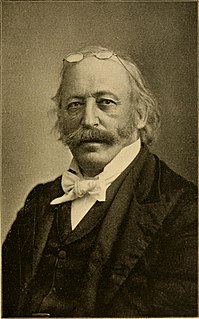Top 1200 Argument Quotes & Sayings - Page 2
Explore popular Argument quotes.
Last updated on April 16, 2025.
The best argument for Christianity is Christians: their joy, their certainty, their completeness. But the strongest argument against Christianity is also Christians-when they are somber and joyless, when they are self-righteous and smug in complacent consecration, when they are narrow and repressive, then Christianity dies a thousand deaths.
If we're not there making the argument then the cultural gulf that Republicans try to exploit saying, "Ah, these city slickers: they're all looking down on you, they don't care about you. They're just trying to help out their various special interest constituencies," that argument ends up being successful.
The terminology of philosophical art is coercive: arguments are powerful and best when they are knockdown, arguments force you to a conclusion, if you believe the premisses you have to or must believe the conclusion, some arguments do not carry much punch, and so forth. A philosophical argument is an attempt to get someone to believe something, whether he wants to beleive it or not. A successful philosophical argument, a strong argument, forces someone to a belief.
The great merit of Stephen Gould's account of the disastrous history of phychometrics is that he shifts the argument from a sterile contest between environmentalists and hereditarians and turns it into an argument between those who are impressed with what our biology stops us doing and those who are impressed with what it allows us to do.
The indispensability argument says (roughly) that if you have ample reason to accept an empirical scientific theory that makes indispensable use of mathematics, and that theory entails that numbers exist, then you have ample reason to accept that numbers exist. The argument affirms the antecedent of this conditional, and concludes that you have ample reason to believe that numbers exist. What is striking about this argument is that it seems to show that the empirical reasons that suffice for accepting a scientific theory also suffice for accepting a metaphysical claim.
Neoliberalism is vulnerable. When it comes to talking about social provisions, the only argument they have is the argument of barbarians: that social provisions make people dependent, and dependency is an evil, and people have to pick themselves up by their bootstraps. And that is such bullshit that it boggles my mind.
I got involved in cultural studies because I didn't think life was purely economically determined. I took all this up as an argument with economic determinism. I lived my life as an argument with Marxism, and with neoliberalism. Their point is that, in the last instance, economy will determine it. But when is the last instance?
They say that 'history is an argument without end.' In Thompson's skillful hands, this momentous argument between two old friends on the most critical issue of the last century is thus history at its best. Thompson's judicious and delicious depiction of Nitze and Kennan will fascinate anyone who cares about the Cold War or the ways that human beings shape the future.
It may be something that future generations are more open to, but I am pretty confident that for the foreseeable future, using the argument of nondiscrimination, and "Let's get it right for the kids who are here right now," and giving them the best chance possible, is going to be a more persuasive argument.
The issue here is this, that the Government's argument at the present moment is the argument that now the war is over, terrorism is defeated, we have to focus on economic development which in the north and east particular, being the areas where the war was fought, development has to proceed at a pace. That people from those parts of the country are leaving seems to suggest a lack of confidence and certainty in the trajectory of this kind of economic development.
It is commonly said that if rational argument is so seldom the cause of conviction, philosophical apologists must largely be wasting their shot. The premise is true, but the conclusion does not follow. For though argument does not create conviction, the lack of it destroys belief. What seems to be proved may not be embraced; but what no one shows the ability to defend is quickly abandoned. Rational argument does not create belief, but it maintains a climate in which belief may flourish.
A good argument diluted to avoid criticism is not nearly as good as the undiluted argument, because we best arrive at truth through a process of honest and vigorous debate. Arguments should not sneak around in disguise, as if dissent were somehow sinister... For it is bravery that is required to secure freedom.
The assumed instinctive belief in God has been used by many persons as an argument for his existence. But this is a rash argument, as we should thus be compelled to believe in the existence of many cruel and malignant spirits, only a little more powerful than man; for the belief in them is far more general than in a beneficent deity.
The indispensability argument seeks to assimilate the epistemology of metaphysical statements to the epistemology of statements that are obviously empirical. I think it fails to achieve this goal. The argument does not refute the Carnapian thesis that scientific theories and metaphysical claims differ epistemologically - observations can provide evidence for the former, but not for the latter.
I shall not convert you at the end of my argument. I think the argument is sound. I hold that belief in God is not merely as reasonable as other belief, or even a little or infinitely more probably true than other belief; I hold rather that unless you believe in God you can logically believe in nothing else.
There is nothing - no program, no hobby, no vice, no crime - that does not 'create jobs'. Tsunamis, computer viruses and shooting convenience store clerks all 'create jobs'. So that claim misses the plot; it applies to all so is an argument in favor of none. Instead of an argument on the merits, it is an admission that one has no such arguments.
You can make a very good argument that society would be much worse off if you let 10 rapists and murderers free rather than put one poor, wrongly accused accountant in prison. And so my only point on that is that it should open up an argument. It should not sort of settle one, because nobody disagrees with it.
If it were true that conservatives were racist, sexist, homophobic, fascist, stupid, inflexible, angry, and self-righteous, shouldn't their arguments be easy to deconstruct? Someone who is making a point out of anger, ideology, inflexibility, or resentment would presumably construct a flimsy argument. So why can't the argument itself be dismembered rather than the speaker's personal style or hidden motives? Why the evasions?
History is the art of making an argument about the past by telling a story accountable to evidence. In the writing of history, a story without an argument fades into antiquarianism; an argument without a story risks pedantry. Writing history requires empathy, inquiry, and debate. It requires forswearing condescension, cant, and nostalgia. The past isn’t quaint. Much of it, in fact, is bleak.
I think that as poets, we can get away with stuff because we can ride on the melt of metaphor. We cover a lot of terrain psychically and temporally and linguistically via metaphor, and that can be a stand-in for an argument, whereas in prose, you have to make the argument, and you have to be convincing because the sequence must make sense in time and purpose.
A rationalist, as I use the word, is a man who attempts to reach decisions by argument and perhaps, in certain cases, by compromise, rather than by violence. He is a man who would rather be unsuccessful in convincing another man by argument than successful in crushing him by force, by intimidation and threats, or even by persuasive propaganda.
The usefulness of religion - the fact that it gives life meaning, that it makes people feel good - is not an argument for the truth of any religious doctrine. It's not an argument that it's reasonable to believe that Jesus really was born of a virgin or that the Bible is the perfect word of the creator of the universe.
Here is the cosmological proof of the existence of God - the design argument of Paley - updated and refurbished. The fine tuning of the universe provides prima facie evidence of deistic design. Take your choice: blind chance that requires multitudes of universes or design that requires only one.... Many scientists, when they admit their views, incline toward the teleological or design argument.
Try to find someone with a sense of humor. That's an important thing to have because when you get into an argument, one of the best ways to diffuse it is to be funny. You don't want to hide away from a point, because some points are serious, but you'd rather have a discussion that was a discussion, rather than an argument.
I was asking if unwinding kills you, or if it leaves you alive somehow. C'mon—it's not like we haven't thought about it." (...) What do you think, Connor?" asks Hayden. "What happens to your soul when you get unwound?" Who says I even got one?" For the sake of argument, let's say you do." Who says I want an argument?
Dawkins’s problem is that he doesn’t know the difference between probabilistic empirical theorizing and strict metaphysical demonstration, and thus misreads an attempt at the latter as if it were the former. That is not to say that Aquinas might not be mistaken at some point in the argument – though obviously I don’t think he is – but if you’re going to show that he is, you first need to understand what kind of argument he is giving, and thus what kind of mistake he’d be making if he’s made one at all.

























































